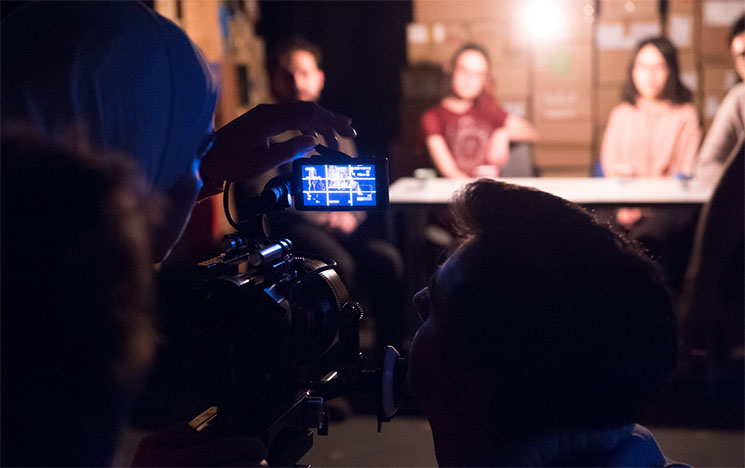Media and film studies
Whether you're studying abroad at Sussex for a semester or year, you can browse our media and film modules below. Immerse yourself in our photographic and video studio, production labs and facilities*.

Browse our modules
You can see our full list of media and film modules below.
Year 1
-
Autumn Semester
- Analysing Film
- Analysing Film (E) - Year 1
- Analysing Film B
- Audiovisual Practices
- Careers in the Cultural & Creative Industries
- Creative Practice: Ideas and Exploration
- Creative Video
- Critical Approaches to Contemporary Media
- European Cinema
- Foundations of Media and Digital Culture
- Sonic Narratives
- Writing the Short Film
- Spring Semester
Year 2
-
Autumn Semester
- Adaptation: Filming Fiction
- Analysing Film (E)
- Box Set TV: Contemporary Serial Television
- Career Strategies in the Creative Sector
- Debates in Screen Documentary
- Debates in Screen Documentary
- Film Finance, Exhibition & Distribution
- Film Musicals
- Horror Films: Fears, Phobias and Fantasies
- Interactive Design
- Intermediate Fiction Filmmaking
- Law, Regulation and Governance B
- Media, Memory, History
- Media and Crisis
- Motion Design
- News, Politics and Power A
- News, Politics and Power B
- Photography: Critical Narratives
- Screenwriting
- Sound, Culture & Society
-
Spring Semester
- Advanced Screenwriting
- Advertising (E)
- Animation
- British Cinema
- Cinema and Climate
- Digital Culture and Algorithmic Society
- Documentary Video
- Latin American Cinema: Contemporary Trends and Movements
- Latin American Cinema: Contemporary Trends and Movements
- Playable Media
- Podcasting
- Researching Media and Communication
- Screenwriting
- TV: Fictions and Entertainments
- Understanding Race and Culture in the Media
Year 3
Not sure how to choose?
Follow our top tips for choosing your modules. You can also find out about our teaching structure, assessment process and how your credits transfer back to your home institution.
Find out more.
Which school will I study in?
Depending on the modules you choose, you'll study in either the Department of Media or Film Studies which is part of the School of Media, Arts and Humanities.
Our academics are publishing books and articles, producing award-winning documentaries and films and influencing policy.
Our students are also producing high-quality productions.
Find out more.
Contact us
If you are studying at Sussex for a semester or year and have questions, email sussexabroad@sussex.ac.uk.
*Access to facilities dependent on modules studied **(Our campus is nine minutes by train from Brighton & Hove) survey by accommodation providers Student Living by Sodexo. Rankings based on full undergraduate degree at Sussex.